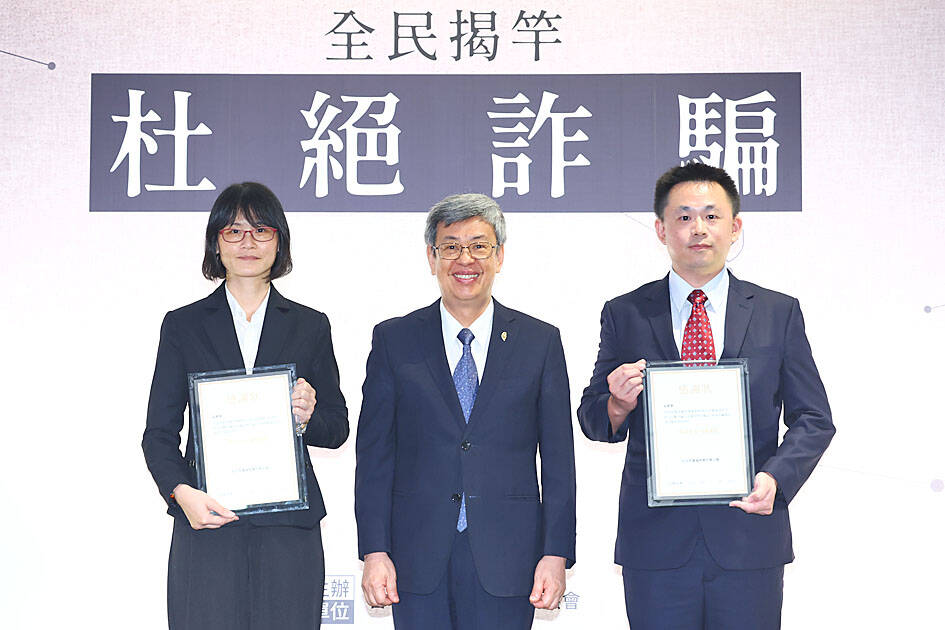Premier Chen Chien-jen (陳建仁) yesterday attended a plaque-revealing ceremony inaugurating the newly established Anti-Fraud Office at the Executive Yuan in Taipei.
The office would play a supervisory role in leading law enforcement efforts and integrating civil society resources in combating fraud, a type of crime that is continuously evolving, Chen said.
The general directive of the organization is to limit any contact, disinformation and damage related to fraud, he said.

Photo: CNA
Anti-fraud efforts must be successfully implemented, he cited President Tsai Ing-wen (蔡英文) as saying in a Cabinet meeting in the morning.
The office would be headed by Executive Yuan adviser Lee Hsien-ming (李賢明) and include one or two officials each from the Ministry of the Interior, Ministry of Justice, Ministry of Digital Affairs, Financial Supervisory Commission and National Communications Commission, the Executive Yuan said.
The anti-fraud office would oversee the full range of the government’s anti-fraud activities and handle major fraud cases when necessary, Vice Premier Cheng Wen-tsan (鄭文燦) said.
He made the remarks at a separate plaque-revealing ceremony for the Taiwan Science and Technology Office for Net-zero Emissions in Taipei.
Taking action against fraud is a top priority of the Tsai administration and it has broad cross-party support, Cheng said.
A government campaign against fraud has led to a decline in text scams, while 2,700 Web sites linked to fraud have been removed from the Internet in the past month, he said.
Asked about mortgage fraud allegations against former Executive Yuan adviser Chen Cheng-kun (陳振坤), Cheng said the former official no longer works for the Cabinet in any capacity.
Regarding recent fraud allegations against the Australia-based Ayers Alliance, he said the foreign-registered company is being investigated by police and financial regulators for suspected unauthorized mortgage trading.
The government has launched initiatives that resulted in the passage of five pieces of legislation targeting telecom fraud, he said, while banking regulators have intercepted suspicious transactions totaling NT$4.5 billion (US$146.27 million) and improved verification processes for payments to curb scams, he said.

The Central Election Commission has amended election and recall regulations to require elected office candidates to provide proof that they have no Chinese citizenship, a Cabinet report said. The commission on Oct. 29 last year revised the Measures for the Permission of Family-based Residence, Long-term Residence and Settlement of People from the Mainland Area in the Taiwan Area (大陸地區人民在台灣地區依親居留長期居留或定居許可辦法), the Executive Yuan said in a report it submitted to the legislature for review. The revision requires Chinese citizens applying for permanent residency to submit notarial documents showing that they have lost their Chinese household record and have renounced — or have never

A magnitude 5.6 earthquake struck off the coast of Yilan County at 12:37pm today, with clear shaking felt across much of northern Taiwan. There were no immediate reports of damage. The epicenter of the quake was 16.9km east-southeast of Yilan County Hall offshore at a depth of 66.8km, Central Weather Administration (CWA) data showed. The maximum intensity registered at a 4 in Yilan County’s Nanao Township (南澳) on Taiwan’s seven-tier scale. Other parts of Yilan, as well as certain areas of Hualien County, Taipei, New Taipei City, Taoyuan, Hsinchu County, Taichung and Miaoli County, recorded intensities of 3. Residents of Yilan County and Taipei received

Taiwan has secured another breakthrough in fruit exports, with jujubes, dragon fruit and lychees approved for shipment to the EU, the Ministry of Agriculture said yesterday. The Animal and Plant Health Inspection Agency on Thursday received formal notification of the approval from the EU, the ministry said, adding that the decision was expected to expand Taiwanese fruit producers’ access to high-end European markets. Taiwan exported 126 tonnes of lychees last year, valued at US$1.48 million, with Japan accounting for 102 tonnes. Other export destinations included New Zealand, Hong Kong, the US and Australia, ministry data showed. Jujube exports totaled 103 tonnes, valued at

BIG SPENDERS: Foreign investors bought the most Taiwan equities since 2005, signaling confidence that an AI boom would continue to benefit chipmakers Taiwan Semiconductor Manufacturing Co’s (TSMC, 台積電) market capitalization swelled to US$2 trillion for the first time following a 4.25 percent rally in its American depositary receipts (ADR) overnight, putting the world’s biggest contract chipmaker sixth on the list of the world’s biggest companies by market capitalization, just behind Amazon.com Inc. The site CompaniesMarketcap.com ranked TSMC ahead of Saudi Aramco and Meta Platforms Inc. The Taiwanese company’s ADRs on Tuesday surged to US$385.75 on the New York Stock Exchange, as strong demand for artificial intelligence (AI) applications led to chip supply constraints and boost revenue growth to record-breaking levels. Each TSMC ADR represents